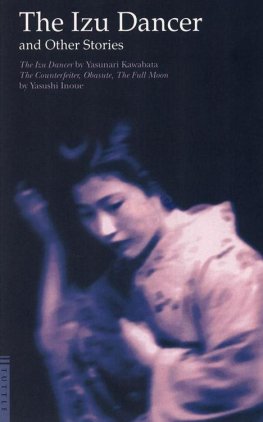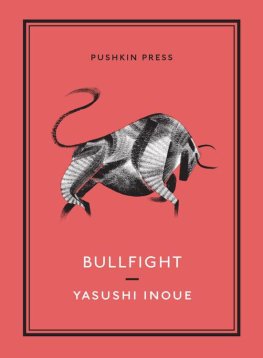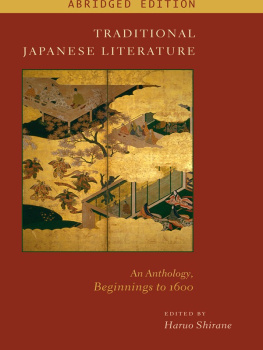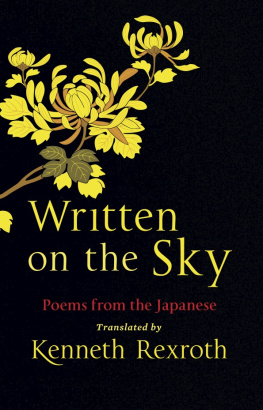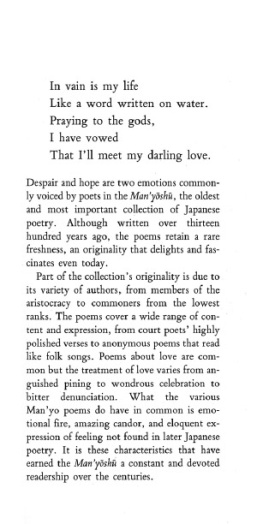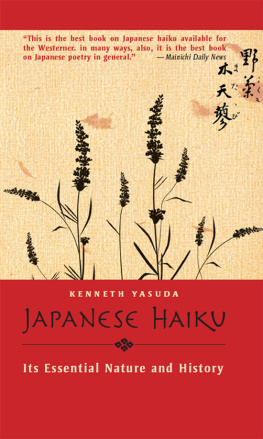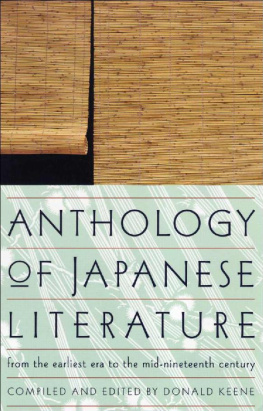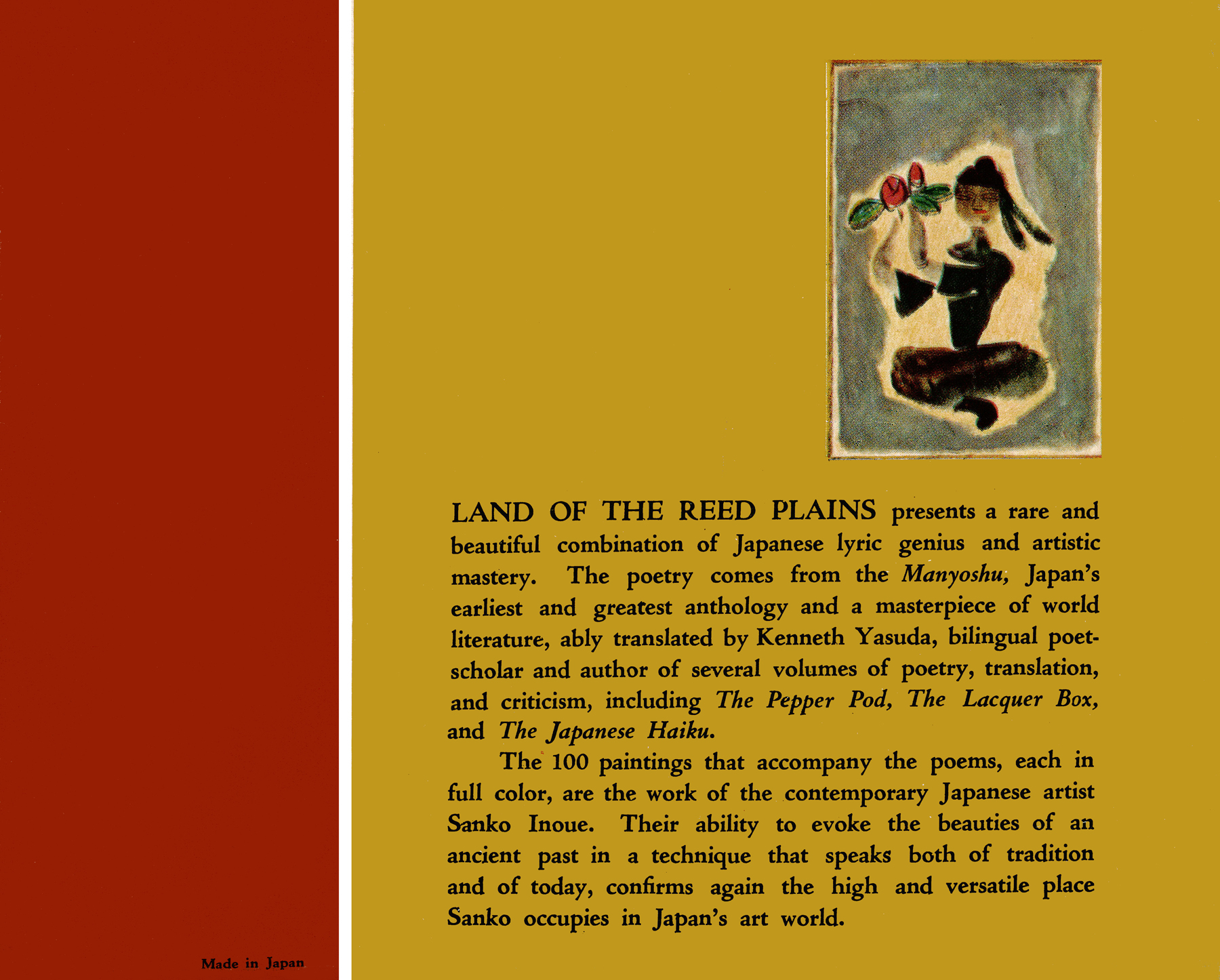INDEX OF AUTHORS AND OTHER ITEMS
Page numbers in italics indicate poems by the person or in the category named.
Akahito; see Yamabe Akahito
Ama no Inukai Okamaro,
Anonymous, 76, 78, 79; see also Azuma-uta; frontier guards, songs of the; "Hitomaro Collection"; "Mushimaro Collection"
Atsumi, Prince,
Awata Princess,
Azuma-uta. 9, 10, 96-116
choka verse form, 11
"Eastland, songs of the"; see Azu-ma-uta
frontier guards, songs of the, 8, 10, 87-94, 109, 112
Fujiwara Kamatari, 10
Fujiwara Umakai, 86
Fuki, Lady, 43
Gemmyo, Empress, 28,
"Harima, a young woman of,"
Hasetsukabe Hitomaro,
Hasetsukabe Inamaro,
Hitomaro; see Kakinomoto Hitomaro
"Hitomaro Collection," 7, 19, 59, 72
Hozumi, Prince,
Imamatsuribe Yosofu,
"Ishikawa, Lady," 51
Iso, Lord of, 30
Isonokami (Lord of Iso), 30
Isonokami Otomaro, 30
Iwa-no-Hime, Empress,
Jito, Empress, 21, 40,
Jomei, Emperor, 17, 53
joshi poetic device, 75, 96
Kakinomoto Hitomaro, 7, 10, 19, 20, 27
Kasa, Lady,
Kasa Kanamura, 52, 67
Katsuraki, Prince (Tachibana Moroe), 31, 36, 37
Kobun, Emperor, 43
Kogyoku, Empress,
"Kojima, a young woman named," 84
Kokashu, 7, 24, 39, 54, 58, 60-66, 68, 69, 71, 83
Kurohito; see Takechi Kurohito
"lady in waiting, a former,"
Mikata Shami, 48,
Mikata Shami, the wife of,
Minabe, Princess, 29
Mommu, Emperor, 74
Mononobe Hirotari, 91
Mushimaro; see Takahashi
"Mushimaro Collection," 7, 95
"Myokan," 37
Naga, Prince, 22
Naga Okimaro, 21
Nakatomi Yakamori, 55
Nintoku, Emperor, 8, 23
Nukada, Princess, 10, 34, 43
"Okakeme, a young woman of Buzen," 85
Oku, Princess, 10, 73
Okura; see Yamanoe Okura
Ono Oyu, 32
"Otomo of Tamura, Lady; the elder daughter of," 47
Otomo Tabito, 10, 81, 82, 84
Otomo Yakamochi, 10, 44, 45, 47, 67, 82, 87
Otsu, Prince, 50, 73
"saints of poetry," 10, 19, 25
sakamori no uta; see frontier guards, songs of the
Sakato Hitotari, 77
Sanu Chigami, 10, 55-57
sedoka verse form, 72
Shihi, Lady, 40,
Shiki, Prince,
Shomu, Emperor, 10, 42
Shotoku, Prince, 10
"Suminoe, a girl of," 22
Tabito; see Otomo Tabito
Tachibana Moroe; see Katuraki, Prince
Tajima, Princess, 80
Takahashi Mushimaro, 7, 10,
Takamiya, Prince, 38
Takechi Kurohito, 10, 74
Takeda, Yukichi, Dr., 14
tanka verse form, 11
Temmu, Emperor, 22, 34, 40, 43, 50, 73, 80
Tenji, Emperor, 18,
"Toneri, attendant maiden," 75
Toochi, Princess, 34, 43
Wakatoneribe Hirotari,
Wakayamatobe Mumaro,
Yakamochi; see Otomo Yakamochi
Yamabe Akahito, 10, 25
Yamanoe Okura, 10,
Yuraku, Emperor, 10
INDEX OF FIRST LINES
Above the water, 46
Ah, like a shadow, 59
Although I have silks, 99
And should I trade, 76
As a sign that tells, 45
As you journey on, 106
As you travel on, 79
At Kamitsuke, 96
At the river-ford, 113
At the very thought, 42
Beside the thicket, 102
Bidding you farewell, 73
Bright and crimson red, 35
By vesper augurs, 65
Down your hair would slip, 48
Each time when I hear, 63
Even if your ship, 107
Even though my hands, 114
Even though you spin, 104
For a warrior, 75
From this very day, 87
Going back and forth, 34
Hillside camellia. 91
How I do recall, 60
How I envy them, 92
How I wish I had known, 22
How will you bear it, 109
I journey onward, 74
I shall wait a while, 36
If I go from her, 105
If we go by sea, 44
If you go away, 70
In awed obedience, 30, 88
In Hikuma Field, 21
In Kudara Field, 25
In miscanthus fields, 47
In the drops of dew, 50
In the great to-do, 90
In the spring garden, 33
In the spring meadow, 111
In twilight darkness, 85
Is it really true, 103
Just as no grass grows, 43
Leaving you to stand, 108
Like the maidenhair, 101
Like the moon tonight, 64
Like the priest who serves, 68
Meeting you that night, 55
My fair beloved, 82
Night crows are cawing. 54
Now newly opened, 110
O beloved one, 23
O drifting snowflakes, 80
O mighty sovereign, 29
Of the one I love, 98
Oh. do not set fire, 116
Oh, my darling wife, 93
Oh, our capital, 32
Oh, sleeping with you, 97
Oh, that in autumn, 61
Oh, the dawn I left, 112
Oh. upon my sleeves, 69
On eastern meadows, 20
On the clouds that trail, 18
Over Mt. Ono, 81
Past Mt. Shiotsu, 52
Should the fallen snow, 95
Since I thought my love, 71
Tell the one I love, 24
The bells are tinkling, 115
The cock is crowing, 66
The flags are blooming, 62
The hour advances, 19
The rushing rapids, 27
The words my father, 89
The yellow roses, 26
Then, on Kose Hill, 77
There was a person. 56
There are the garments, 57
Though I said, "No more!", 40, 41
Though I thought myself, 84
Though I thought of you, 37
Though my wife grows old, 39
Though now everyone, 49
Though our foes may be, 86
Through wide Uchi Plain, 17
To long after you, 67
Until young maples. 100
Waiting long for me, 51
We can hear the sounds, 28
When evening comes, 53
When I take the harp, 83
When nights are frosty, 94
When the frost lies white, 78
While I stay alone, 58
Who is it that breaks, 72
With Asaka Hill, 31
With swollen eyelids, 38
LAND OF THE REED PLAINS
T HROUGH wide Uchi Plain
with the horses drawn abreast
this early morning
I think he must be riding...
through that thickly grass-grown field.

Ascribed to Empress Kogyoku (594-661). An envoy to a poem sent her husband, Emperor Jomei, in 641 on the occasion of a hunting expedition he made on the Uchi Plain.
[1 : 4]
O N the clouds that trail
like richly colored banners
far across the sea,
the setting sun is shining...
clear must be the moon tonight.



